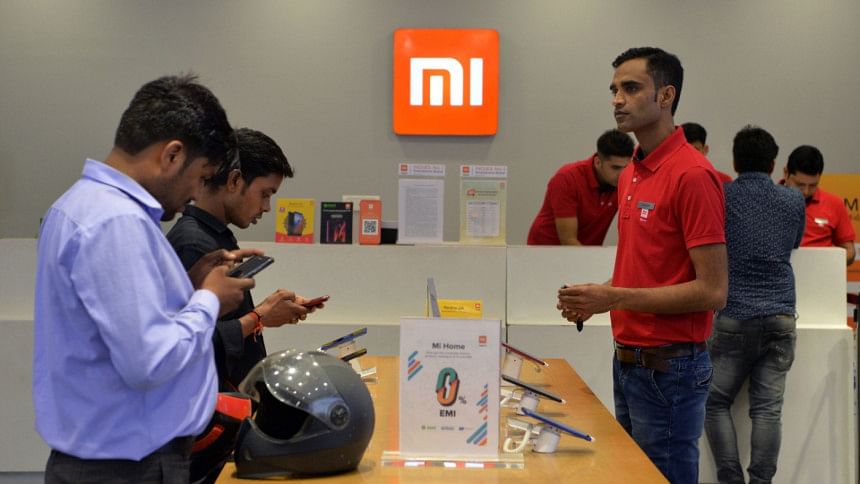Xiaomi banks on phone data for finance play in India

China’s Xiaomi is poised to launch a consumer lending business in India in the coming weeks, making an ambitious tilt at the booming financial services market where data privacy concerns and fierce competition present formidable challenges.
The stakes are high for the world’s fourth largest mobile phone vendor, whose business model relies on low-margin hardware sales with services as a key long-term profit centre. The company reported disappointing second-quarter earnings on Tuesday and its shares are trading at slightly over half their 2018 IPO price
Xiaomi is betting it can leverage its number one position in India’s smartphone market to tap into the country’s lucrative but crowded financial services sector. Yet, the mounting public concern over data privacy, which has forced tech giants like Google and Facebook to change the way they do business, could make it a bumpy road for the Chinese firm.
Indeed, Xiaomi’s approach to data collection and privacy has raised eyebrows among some of those familiar with its international expansion plans. The company remains a small player in financial services in its home country, according to documents seen by Reuters.
Xiaomi faces ferocious competition across Asia from banks, global tech giants, fintech startups and others who are scrambling for position in the region’s booming digital economy.
In Indonesia, another key market, Xiaomi’s financial unit had to shut down in late 2018 due to a disagreement with regulators over licensing.
A source familiar with Xiaomi’s India efforts said the company was doing well there with its first offering, a payment app called Mi Pay that launched in March.
“They seem to be following the market leaders, Apple and Google, where a smartphone eventually will become more than a phone and more of a financial play,” the source told Reuters.
Xiaomi’s new Mi Credit service in India, offering loans of up to 100,000 rupees ($1,451) with interest rates starting at 1.8 percent, is scheduled to debut in the coming weeks. The Xiaomi spokesman told Reuters that Mi Credit was operating in “beta phase” but declined to share details.
India is Xiaomi’s largest market outside China, and it boasts an installed base of some 70 million phones there, according to market researcher Counterpoint.
Xiaomi’s fintech revenues rose 62.7 percent year-on-year to 112 million (RMB 792 million) for the second quarter, the company reported Tuesday, with a focus on “consumer loans and supply chain financing.”
Xiaomi uses data from phone activity to create credit profiles based on a customer’s “identity, life stage, lifestyle, social relationships, and brand loyalty,” according to documents seen by Reuters.
The privacy issue has spooked at least one potential bank partner in Indonesia, Xiaomi’s second-largest overseas market after India, which backed away from a deal in part because of concerns about invasive data collection, a senior executive at the bank told Reuters.
Consumers who apply for the services in India sign broad agreements consenting to share their personal data with Xiaomi, including everything from “professional and educational backgrounds” to “temporary messages history” and information related to “use of certain apps and websites”.
The agreement also includes a disclosure that Xiaomi may share “personal information from time to time to Xiaomi affiliated companies...or third party service providers.”
The banker in Indonesia told Reuters a presentation he saw showed the company scans phone owners’ private data for mentions of lifestyle changes, such as a divorce or a promotion, as part of its approach to credit scoring.
Apar Gupta, executive director at advocacy group Internet Freedom Foundation, said a lack of data privacy laws and regulations in India left users vulnerable.
“The risks include information collection which goes beyond the reasonable contemplation of a user,” Gupta said. “If they do not have adequate notice of what information is being gathered they have no meaningful way of knowing what they are bartering away in order to get a loan.”
A Xiaomi spokesman told Reuters “user privacy and data protection is of utmost importance to us,” and the firm had a “strong data protection agreement” in place with its lending partners in India.
Moreover, privacy concerns may not be top of mind for Xiaomi phone owners, many of whom are drawn by the relatively bargain prices of the hardware.
“Banks usually ask for a lot of documents before giving out a loan. If Xiaomi lends me money quickly, and without too many documents, I won’t mind sharing my data with the company,” said 29-year Akshay Pawar, a Xiaomi phone owner in Aurangabad in Western India. “100,000 rupees is a decent amount, good enough to buy a new motorcycle.”
And the phone data appears to be effective in analysing risk: Xiaomi’s non-performing loan ratio is under 2 percent, according to documents seen by Reuters, very low for consumer loans with the average ticket size of $1000 dollars.
In China, Xiaomi’s lending business boasted a loan book of $8 billion, with $2 billion in outstanding balances, as of mid-2018, according to documents seen by Reuters. Mi Pay, operated in partnership with Chinese bank card provider UnionPay, has achieved an annual $12 billion in gross merchandise volume for China, with 20 million active users, according to the documents.
That leaves it far behind Chinese rivals such as WeChat Wallet and Alipay.
The China figures have not previously been reported. A spokesman for Xiaomi said the figures were valid as of May 2018, but declined to give the 2019 figures.

 For all latest news, follow The Daily Star's Google News channel.
For all latest news, follow The Daily Star's Google News channel. 



Comments